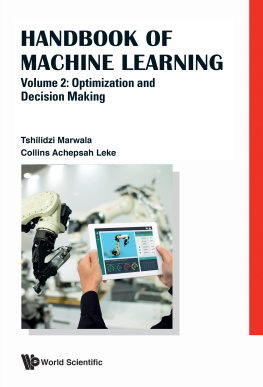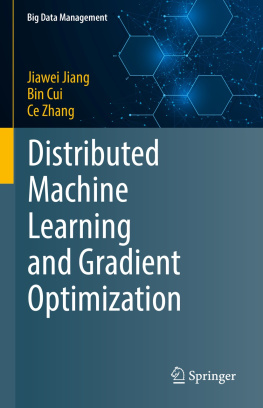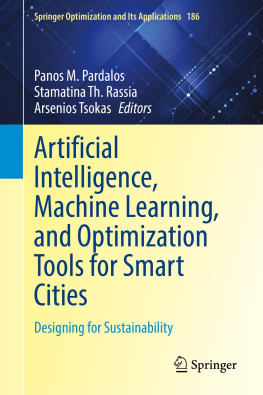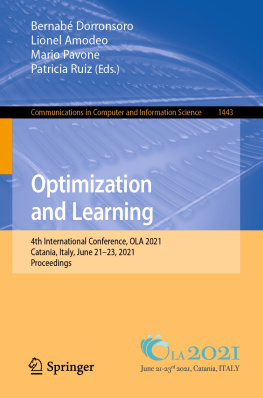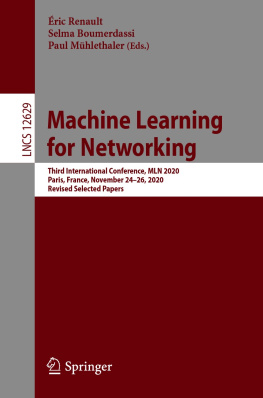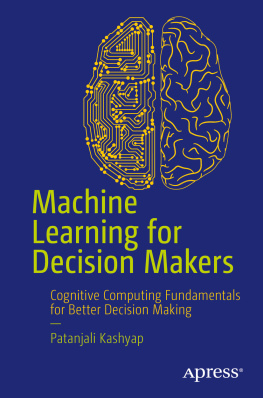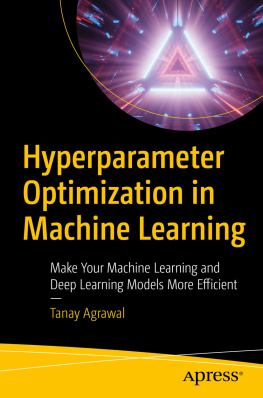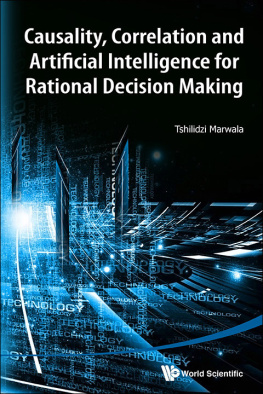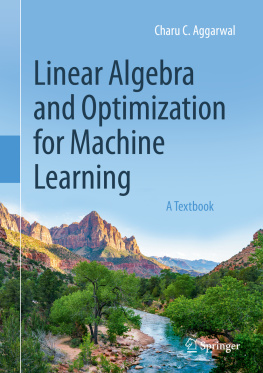Marwala Tshilidzi - Handbook Of Machine Learning - Volume 2: Optimization And Decision Making
Here you can read online Marwala Tshilidzi - Handbook Of Machine Learning - Volume 2: Optimization And Decision Making full text of the book (entire story) in english for free. Download pdf and epub, get meaning, cover and reviews about this ebook. year: 2020, publisher: World Scientific Publishing Company, genre: Romance novel. Description of the work, (preface) as well as reviews are available. Best literature library LitArk.com created for fans of good reading and offers a wide selection of genres:
Romance novel
Science fiction
Adventure
Detective
Science
History
Home and family
Prose
Art
Politics
Computer
Non-fiction
Religion
Business
Children
Humor
Choose a favorite category and find really read worthwhile books. Enjoy immersion in the world of imagination, feel the emotions of the characters or learn something new for yourself, make an fascinating discovery.
- Book:Handbook Of Machine Learning - Volume 2: Optimization And Decision Making
- Author:
- Publisher:World Scientific Publishing Company
- Genre:
- Year:2020
- Rating:3 / 5
- Favourites:Add to favourites
- Your mark:
- 60
- 1
- 2
- 3
- 4
- 5
Handbook Of Machine Learning - Volume 2: Optimization And Decision Making: summary, description and annotation
We offer to read an annotation, description, summary or preface (depends on what the author of the book "Handbook Of Machine Learning - Volume 2: Optimization And Decision Making" wrote himself). If you haven't found the necessary information about the book — write in the comments, we will try to find it.
Marwala Tshilidzi: author's other books
Who wrote Handbook Of Machine Learning - Volume 2: Optimization And Decision Making? Find out the surname, the name of the author of the book and a list of all author's works by series.
Handbook Of Machine Learning - Volume 2: Optimization And Decision Making — read online for free the complete book (whole text) full work
Below is the text of the book, divided by pages. System saving the place of the last page read, allows you to conveniently read the book "Handbook Of Machine Learning - Volume 2: Optimization And Decision Making" online for free, without having to search again every time where you left off. Put a bookmark, and you can go to the page where you finished reading at any time.
Font size:
Interval:
Bookmark:

HANDBOOK OF
MACHINE LEARNING
Volume 2: Optimization and
Decision Making
HANDBOOK OF
MACHINE LEARNING
Volume 2: Optimization and
Decision Making
Tshilidzi Marwala
Collins Achepsah Leke
University of Johannesburg, South Africa

Published by
World Scientific Publishing Co. Pte. Ltd.
5 Toh Tuck Link, Singapore 596224
USA office: 27 Warren Street, Suite 401-402, Hackensack, NJ 07601
UK office: 57 Shelton Street, Covent Garden, London WC2H 9HE
Library of Congress Cataloging-in-Publication Data
Names: Marwala, Tshilidzi, 1971 author.
Title: Handbook of machine learning / by Tshilidzi Marwala (University of Johannesburg, South Africa).
Description: New Jersey : World Scientific, 2018- | Includes bibliographical references and index. Contents: volume 1. Foundation of artificial intelligence
Identifiers: LCCN 2018023989 | ISBN 9789813271227 (hc : alk. paper : v. 1)
Subjects: LCSH: Machine learning. | Artificial intelligence.
Classification: LCC Q325.5 .M3688 2018 | DDC 006.3/1--dc23
LC record available at https://lccn.loc.gov/2018023989
British Library Cataloguing-in-Publication Data
A catalogue record for this book is available from the British Library.
Volume 2. Optimization and Decision Making
by Tshilidzi Marwala and Collins A. Leke
ISBN 978-981-120-566-8
Copyright 2020 by World Scientific Publishing Co. Pte. Ltd.
All rights reserved. This book, or parts thereof, may not be reproduced in any form or by any means, electronic or mechanical, including photocopying, recording or any information storage and retrieval system now known or to be invented, without written permission from the publisher.
For photocopying of material in this volume, please pay a copying fee through the Copyright Clearance Center, Inc., 222 Rosewood Drive, Danvers, MA 01923, USA. In this case permission to photocopy is not required from the publisher.
For any available supplementary material, please visit
https://www.worldscientific.com/worldscibooks/10.1142/11425#t=suppl
Desk Editors: Herbert Moses/Yu Shan Tay
Typeset by Stallion Press
Email:
Printed in Singapore
Preface
Handbook of Machine Learning: Optimization and Decision-Making Volume 2, discusses the concepts and applications of optimization algorithms as well as other concepts like economic modeling and decision-making. The optimization algorithms that are studied include NelderMead simplex method, conjugate gradient descent, BroydenFletcherGoldfarbShanno, genetic algorithm, simulated annealing, particle swarm optimization, response surface method, ant colony optimization, bat algorithm, firefly algorithm, artificial immune system, invasive weed optimization algorithm, Cuckoo search, decision trees and random forests. In addition, this book explores hybrid methods, economic modeling, condition monitoring and rational decision-making.
These algorithms are used to solve the missing data, finite element model updating, Sudoku, remanufacturing and condition monitoring problems.
This book is an interesting reference for graduate students, researchers and artificial intelligence practitioners.
Tshilidzi Marwala and Collins Achepsah Leke
University of Johannesburg
March 2019
About the Authors

Tshilidzi Marwala, born in Venda (Limpopo, South Africa), is the Vice Chancellor and Principal of the University of Johannesburg. Previously, he was the Deputy Vice Chancellor for Research and Internationalization and the Executive Dean of the Faculty of Engineering and the Built Environment both at the University of Johannesburg. From 2003 to 2008, he progressively held the positions of Associate Professor, Full Professor, the Carl and Emily Fuchs Chair of Systems and Control Engineering as well as the SARChI Chair of Systems Engineering at the Department of Electrical and Information Engineering at the University of the Witwatersrand. From 2001 to 2003, he was the Executive Assistant to the Technical Director at South African Breweries. From 2000 to 2001, he was a post-doctoral research associate at the Imperial College (then University of London). He holds a Bachelor of Science in Mechanical Engineering (magna cum laude) from Case Western Reserve University (USA) in 1995, a Master of Mechanical Engineering from the University of Pretoria in 1997 and a Ph.D. specializing in Artificial Intelligence and Engineering from the University of Cambridge in 2000. Marwala completed the Advanced Management Program (AMP) at Columbia University Businesses School in 2017 and completed a Program for Leadership Development (PLD) at Harvard Business School in 2007. Tshilidzi is a registered professional engineer, a Fellow of TWAS (The World Academy of Sciences), the Academy of Science of South Africa, the African Academy of Sciences and the South African Academy of Engineering. He is a Senior Member of the Institute of Electrical and Electronics Engineering (IEEE) and a distinguished member of the Association for Computing Machinery (ACM). His research interests are multi-disciplinary, and they include the theory and application of artificial intelligence to engineering, computer science, finance, social science and medicine. He has extensive track record in human capacity development having supervised 47 Masters and 28 Doctoral students to completion. Some of these students have proceeded with their doctoral and post-doctoral studies at leading universities such as Harvard, Oxford, Cambridge, British Columbia, Rutgers, Purdue, Chiba and Waseda. He has published 13 books in artificial intelligence, one of these has been translated into Chinese, over 300 papers in journals, proceedings, book chapters and magazines and holds four patents. He is an Associate Editor of the International Journal of Systems Science (Taylor and Francis Publishers). He has been a visiting scholar at Harvard University, University of California at Berkeley, Wolfson College of the University of Cambridge and Nanjing Tech University as well as member of the programming council of the Faculty of Electrical Engineering at the Silesian University of Technology in Poland. He has received more than 45 awards including the Order of Mapungubwe and was a delegate to the 1989 London International Youth Science Fortnight (LIYSF) when he was in high school. His writings and opinions have appeared in the magazines New Scientist, The Economist and Time Magazine.

Collins Achepsah Leke, born in Yaounde (Cameroon), is a lecturer at the University of Johannesburg. He holds a Bachelor of Science with Honours in Computer Science from University of the Witwatersrand, a Master of Engineering from the University of Johannesburg and a Ph.D. in Engineering from the University of Johannesburg. His research interests include the applications of computational intelligence to engineering, computer science, finance, social science and medicine. He has published one book on Deep Learning and missing data in engineering systems.
Font size:
Interval:
Bookmark:
Similar books «Handbook Of Machine Learning - Volume 2: Optimization And Decision Making»
Look at similar books to Handbook Of Machine Learning - Volume 2: Optimization And Decision Making. We have selected literature similar in name and meaning in the hope of providing readers with more options to find new, interesting, not yet read works.
Discussion, reviews of the book Handbook Of Machine Learning - Volume 2: Optimization And Decision Making and just readers' own opinions. Leave your comments, write what you think about the work, its meaning or the main characters. Specify what exactly you liked and what you didn't like, and why you think so.

